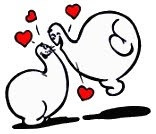Be it God's will, random biological chance, or aliens, nature has flourished as an artist. But no artist can reach her highest potential or greatest appreciation for the majesty of her work without a great critic to complement her. For nature, that critic is Andy Goldsworthy.
His most meaningful works are composed of natural, unaltered materials nearly as eccentric as he is—spit to glue icicles, sharpened twigs to pin bracken—with no greater tools than his own two hands and, occasionally, his teeth. Rock balancing, however, requires a sense of gravity, judgment of form, tactile intuition, and “understanding of the stone” that Goldsworthy clearly has. His egg-shaped cairns have made him a renowned rock balancer, but they are also heavy with meaning for Goldsworthy as both an artist and a critic who creates within the greater creations of nature.
Taken individually, the general egg form of Goldsworthy's cairns combines overt organic imagery with the covert insinuations innate within human interference with nature. The egg is the minimalistic, aesthetically pleasing symbol of birth; the cairn is rife with the jutting and fractured complexity of stone. The two together form a heavily layered symbol of life, manipulated to hyperbole in its exaggerated scale—Goldsworthy's own take on nature's form.
Anyone—with balance, practice, and luck—could stack rocks or even approximate Goldsworthy's style of cairn, but his larger-than-life constructions both prove his dexterous mettle and cement his artistic interpretation as something other than a knock-off of nature. The gathering of rocks that eventually becomes a cairn also imposes order upon the random scatterings of nature, while remaining a chaotic sight to behold even when perfect balance is attained.
Taken together, Goldsworthy's cairns are symbols of travel that demonstrate the interconnectivity of the world that everyday life glosses over. Cairns are historically path markers for anonymous travelers, but Goldsworthy's are also the focal points of a personal network of ley lines that link the “journeys and places that [he feels] an attachment towards,” as he comments in “Rivers and Tides,” the biographical documentary of his art.

No comments:
Post a Comment